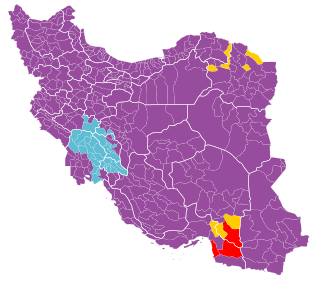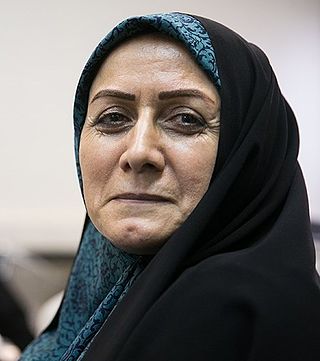The Iranian City and Village Councils election of 2006 took place on December 15, 2006. People elected representatives for City and Village Councils, who in their turn elected the mayors.

Presidential elections were held in Iran on 14 June 2013. Hassan Rouhani was elected in the first round with over 50% of the vote. Tehran Mayor Mohammad Bagher Ghalibaf finished second with 17% of the vote. Voter turnout was 73%.
The Front of Islamic Revolution Stability is an Iranian principlist political group described as "extreme end of the fundamentalist camp" and "Iran’s most right-wing party".

Voice of Nation Coalition was an electoral list for Iranian 2012 and 2016 legislative elections, led by Ali Motahari.
The fifth Iranian Assembly of Experts election were held in Iran on 26 February 2016 to elect the members of the Assembly of Experts. All 88 members of the Assembly of Experts, who are known as mujtahids, are directly elected. The elections had been planned for 2014, but were delayed in order for the election to be held alongside the Islamic Consultative Assembly elections.

Shahrbanoo Amani Anganeh was a member of the Islamic Consultative Assembly for its fifth and sixth term from electoral district of Urmia from the Iranian reform movement. She was the senior adviser of Masoumeh Ebtekar, head of Environmental Protection Organization of Iran.

This is a summary of the electoral history of Akbar Hashemi Rafsanjani, an Iranian politician who was member of Assembly of Experts from Tehran Province since 1982 and Chairman of the Expediency Discernment Council since 1989, and has been previously Chairman of the Assembly of Experts (2007–2011), President of Iran (1989–1997), and The Speaker and member of Islamic Consultative Assembly (1980–1989) from Tehran and Minister of Interior (1979–1980).
This is a summary of the electoral history of Mahmoud Ahmadinejad, an Iranian Principlist politician who was President of Iran (2005–2013) and Mayor of Tehran (2003–2005).
This is a summary of the electoral history of Hassan Rouhani, an Iranian politician who is currently President of Iran since 2013 and member of the Assembly of Experts from Tehran Province since 2000. He was previously member of the Islamic Consultative Assembly (1980–2000).

The Islamic City Council of Tabriz is the elected council that presides over the city of Tabriz, elects the Mayor of Tabriz, and budgets of the Municipality of Tabriz. The council is composed of twenty-one members elected from single-member districts for four-year terms. The Chairman and the Deputy Chairman of the Council are chosen by the council at the first regular meeting in odd-numbered years. In the last election between Principlists and reformers, Principlists won the most seats.
The Council for Coordinating the Reforms Front or the Reformist Front Coordination Council is the umbrella organization, coalition and council of main political groups within the Iranian reform movement. Since 2015, it is overseen by the Reformists' Supreme Council for Policy-making.
Front of Transformationalist Principlists is an Iranian principlist political group, consisting of Society of Devotees of the Islamic Revolution and Society of Pathseekers of the Islamic Revolution.

The Coalition of the Pleasant Scent of Servitude, the Sweet Scent of Servitude or the Joyful Essence of Obedience was a conservative political group in Iran that supported Mahmoud Ahmadinejad and his government.

Elaheh Rastgou is an Iranian conservative-minded reformist politician who was formerly a member of City Council of Tehran and a Member of Parliament.
Local elections were held in Iran on 19 May 2017 to elect members of the City and Village Councils simultaneously with the twelfth presidential election.
Bahram Parsaei is an reformist politician who was a member of the Parliament of Iran representing Shiraz electoral district. He was elected as a parliament member in the 2016 election with 197,471 votes. He is the spokesperson of both Hope fraction and The Ninety Point Commission in the parliament. He was a former member of Shiraz's city council, being elected in 2013 local election, but resigned on 15 June 2015 in favor of standing at the parliamentary election.
This is an overview of the 2004 Iranian legislative election in Tehran, Rey, Shemiranat and Eslamshahr electoral district. Alliance of Builders of Islamic Iran was able to win 29 out of 30 seats in the constituency in the first round.

Presidential elections were held in Iran on 18 June 2021, the thirteenth since the establishment of the Islamic Republic in 1979. Ebrahim Raisi, the then Chief Justice of Iran, was declared the winner in a highly controversial election. The election began with the mass disqualification of popular candidates by the Guardian Council, and broke records of the lowest turnout in Iranian electoral history, as well as had the highest share of protest blank, invalid and lost votes despite a declaration by the Supreme Leader of Iran, Ali Khamenei, considering protest voting religiously forbidden (haraam) as it would "weaken the regime." Reporters Without Borders reported 42 cases of journalists being summoned or threatened for writing about candidates, and the chief of the police threatened people who discouraged others to vote.







